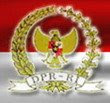
THE 17th ANNUAL MEETING OF THE ASIA-PACIFIC PARLIAMENTARY FORUM (APPF) was held on 11-15 January 2009, Vientiane Capital, Lao PDR and Indonesia participated with 7 delegates from DPR –RI ( the House of Representatives of RI ) and 5 delegates from the DPD RI ( Senate ) as followed :
1. Hon. Mrs. Maryamah Nugraha , as the head of delegation
2. Hon. Mr. Abdillah Toha
3. H.E. Dr. Laode Ida
4. Hon. Prof. Dr. Mrs. Wila Chandrawila Supriadi
5. Hon. Mr. Pupung Suharis Soegito
6. Hon. Mr. Dr. Hakim Sorimuda Pohan
7. Hon. Mr. Soeharno P.A.
8. Hon. Mr. Abdi Sumaithi
9. Hon. Mr. Nyoman Rudana
10. Hon. Mr. Malik Raden
11. Hon. Mr. Muchtar Naim
12. Hon. Mrs. Nafisah Sahal
13. Mr. Tatang Sutharsa, SH - Secretary
14. Dr. Genius Umar - Secretary
15. Mr. Ibnu Hadi - Advisor
DPD - RI delegates with Laos representative ( 4 th from left)
1. Hon. Mrs. Maryamah Nugraha , as the head of delegation
2. Hon. Mr. Abdillah Toha
3. H.E. Dr. Laode Ida
4. Hon. Prof. Dr. Mrs. Wila Chandrawila Supriadi
5. Hon. Mr. Pupung Suharis Soegito
6. Hon. Mr. Dr. Hakim Sorimuda Pohan
7. Hon. Mr. Soeharno P.A.
8. Hon. Mr. Abdi Sumaithi
9. Hon. Mr. Nyoman Rudana
10. Hon. Mr. Malik Raden
11. Hon. Mr. Muchtar Naim
12. Hon. Mrs. Nafisah Sahal
13. Mr. Tatang Sutharsa, SH - Secretary
14. Dr. Genius Umar - Secretary
15. Mr. Ibnu Hadi - Advisor
DPD - RI delegates with Laos representative ( 4 th from left)

The Asia-Pacific Parliamentary Forum Executive Committee Meeting was held on Sunday 11 January 2009. Participants included representatives from the 8 of the 9 Executive Committee member countries, namely: Canada, Chile, China, Indonesia, Japan, Lao PDR, New Zealand and Singapore.
The meeting was chaired by His Excellency Thongsing Thammavong, President of the APPF and President of the National Assembly of Lao PDR.
The Executive Committee resolved that:
1. The agenda of the 17th Annual Meeting of the Asia-Pacific Parliamentary Forum, as set out in annex 1 be approved;
2. The Programme of Activities for the 17th Annual Meeting of the Asia- Pacific Parliamentary Forum, as set out in annex 2 be approved;
3. Hon. Dr. Saysomphone Phomvihane, Vice-President of the National Assembly of Lao PDR, and Hon. Dr. Kukeo Akhamontri, Vice-Chair of Foreign Affairs Committee be Vice-Chairs of the plenary sessions;
4. Prof. Dr. Boungnong Boupha, Member of the National Assembly of Lao PDR, be the Chairperson of the Drafting Committee;
5. The report on ARF 2008 will be presented by Singapore during the 2nd Plenary Session on 13th January 2009;
6. The draft resolutions submitted by the national delegations to the 17th Annual Meeting of the Asia-Pacific Parliamentary Forum, as set out in annex 3, be approved;
7. The time limits for speakers at the plenary sessions be 7 minutes for speeches and 5 minutes for participants in the open debate;
8. The Drafting Committee be created, and the necessary working groups be set up
9. Singapore host the 18th Annual Meeting of the Asia-Pacific Parliamentary Forum from 17-23 January 2010
10. The question of the enlargement of the APPF Executive Committee’s organization be further considered at the 18th APPF Annual Meeting; the APPF membership, observer status and rules of procedures be discussed on item IV: APPF matters in details later; and the Executive Committee may convene again during the meeting as required.
Cultural night - Welcome dinner

AGENDA MEETING OF 17TH APPF LAOS
Introduction of delegations
Adoption of decisions of the Executive Committee
I. Economic and Trade Matters ( 4 hrs duration )
1. Global Financial Crisis and APPF Effective Response
2. APEC 2008 in Peru: Report by Peru
3. WTO 2008
4. Sustainable Tourism
5. Energy Security
6. Food Security
7. Others

AGENDA MEETING OF 17TH APPF LAOS
Introduction of delegations
Adoption of decisions of the Executive Committee
I. Economic and Trade Matters ( 4 hrs duration )
1. Global Financial Crisis and APPF Effective Response
2. APEC 2008 in Peru: Report by Peru
3. WTO 2008
4. Sustainable Tourism
5. Energy Security
6. Food Security
7. Others
II. Political and Security Matters ( 3 hrs duration )
1. Review of the Political and Security Situation in the Asia Pacific Region and
in the World
a. ARF 2008 in Singapore : Report by Singapore
b, Peace and Stability in North East Asia
c. Peace and Stability in South East Asia
d. Middle-East Peace Process
e. Cluster Munitions
f. Terrorism
2. Others

III. Inter-Parliamentary Cooperation ( 2 : 30 hrs duration )
1. Parliamentary Capacity Building
2. Handling Climate Change and Environmental Issue
3. Natural Disaster Management
4. Poverty Reduction
5. Gender Issues in Parliament
6. Others
IV. APPF Matters ( 3 hrs duration )
1. APPF in Future (Membership, Observer Status, Rules of Procedures)
2. Date and Venue of APPF’s 18th Annual Meeting
3. Others
Adoption of Resolutions and the Joint Communiqué
1. Review of the Political and Security Situation in the Asia Pacific Region and
in the World
a. ARF 2008 in Singapore : Report by Singapore
b, Peace and Stability in North East Asia
c. Peace and Stability in South East Asia
d. Middle-East Peace Process
e. Cluster Munitions
f. Terrorism
2. Others

III. Inter-Parliamentary Cooperation ( 2 : 30 hrs duration )
1. Parliamentary Capacity Building
2. Handling Climate Change and Environmental Issue
3. Natural Disaster Management
4. Poverty Reduction
5. Gender Issues in Parliament
6. Others
IV. APPF Matters ( 3 hrs duration )
1. APPF in Future (Membership, Observer Status, Rules of Procedures)
2. Date and Venue of APPF’s 18th Annual Meeting
3. Others
Adoption of Resolutions and the Joint Communiqué
With Senator Nyoman Rudana
















